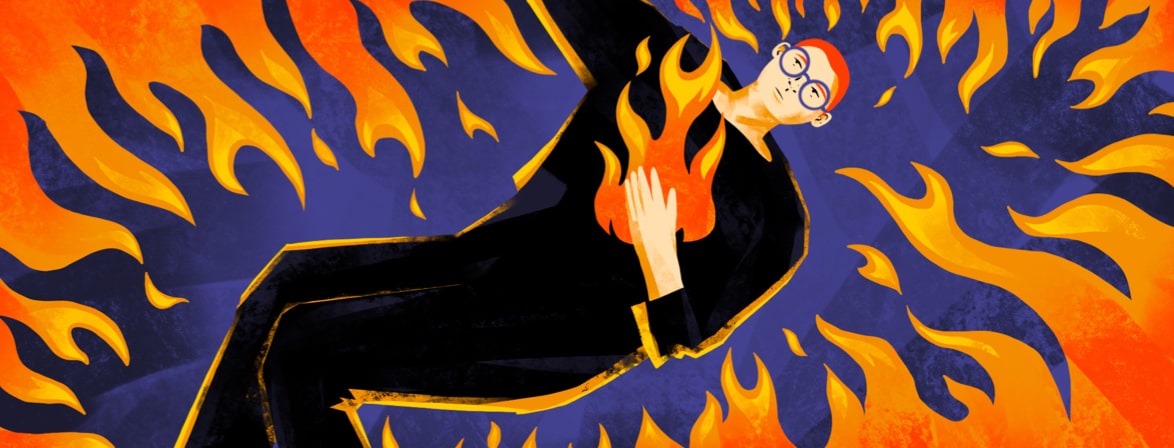Ulcerative Colitis and Acid Reflux
Life with ulcerative colitis comes with many symptoms. From diarrhea, rectal bleeding, abdominal pain, an urgency to defecate, fatigue, and weight loss, so many issues creep up that it's challenging to know what other health issues relate to our UC.
Lately, I've noticed an interesting occurrence after I eat: acid reflux. As a youngster, I never experienced acid reflux. Now, at age 52, I feel the bubbly insurgence of acid after every meal. What's the cause? Is the acidic revolt in my body due to age? Or is it a common symptom of ulcerative colitis?
Is my acid reflux related to my UC?
With a curious mind, I went Googling. Surprisingly (note: sarcasm), I discovered both "yes" and "no" to my query of whether acid reflux is common with ulcerative colitis. Some sources claim that many people with IBD exhibit gastritis, which is inflammation in the stomach. This inflammation can increase acid production.
Likewise, I read other sources that claim the opposite. Because colitis occurs in the rectum, it's too far away to affect the esophagus. This explanation lies as the basis of not associating UC with heartburn or reflux.
Now, for those with Crohn's, the answer looks different. Because Crohn's disease can affect a person's body from the mouth to the rectum, the esophagus can also be affected.
So, what am I to do? Do I just assume my reflux results from age? (Honestly, I scoff at all those folks who look at me and say, "Well, you're now at the age...") Or do I try to be a bit more proactive? As the somewhat obstinate gal that I am, I decide to approach my acid reflux as I've always approached my UC: Be proactive.
Talking to my gastroenterologist
First, I've scheduled an appointment with my gastroenterologist. Well, to be honest, it's "the most wonderful time of the year," which means I need a colonoscopy. As one living with an increased risk of developing colorectal cancer (CRC), medical experts recommend surveillance of the colon every 1 to 2 years after diagnosis of IBD. So, it's time to ingest the "nuclear laxative" and surveil my glorious digestive system.
But my plan is to discuss recent issues with acid reflux during my appointment with my GI. Could I possibly have GERD (gastrointestinal reflux disease)? Checking for that involves an upper GI endoscopy. I haven't had an endoscopy since my initial IBD diagnosis back in 1990. Like a colonoscopy, this test – in my opinion – is just as stressful, but I'm also a scaredy cat with medical procedures.
Lifestyle changes that help reflux (and my UC)
Next, I could also make some personal changes to my lifestyle habits. All sources that I consulted unanimously recommend eating smaller meals and eating slower. I could try to eat smaller meals, but I find it challenging as a working professional. Sadly, my time and work breaks get dictated by the job. I can't just stop and eat whenever I please. That freedom doesn't exist for me.
But I could slow down my eating time. That requires ignoring my husband, who eats super fast. He approaches every aspect of life at warp speed – even his eating. So, I might end up sitting alone at the table finishing my food, which I could do. Is it ideal? No, I want to finish when he does so we can move on to the next activity. If I want to remedy the acid, though, I need to adopt a slower eating pace. Besides, eating slowly helps my colitis. Therefore, that's a twofold benefit.
Avoiding trigger foods
Another lifestyle change involves avoiding foods and beverages that trigger heartburn and/or acid. Some of these foods include chocolate, spicy food, and coffee. Dang! A female needs her chocolate. If not, people around her suffer. Well, maybe dark chocolate is less acidic. I'll try that in small doses and see if it still affects my reflux. I'm also all right in reducing spicy food, and coffee doesn't agree with my UC, so I already avoid it.
Then, I also need to avoid eating so close to bedtime. Again, I prefer to eat around 5 p.m., but again, my husband enjoys eating later because he loves to be outside until the sun sets. During winter time, that changes. So, for now, I can dictate our meal times easier. I'll worry about summer hours later.
Weight gain in UC remission: a factor?
Finally, the 1 lifestyle change I dread the most lives as its own cuss word in my head: weight. I need to lose weight. The message screams out every time I struggle to button my pants each day. Since I'm currently in UC remission, weight exists as a major challenge. When a person feels good, they eat. Right? At my age, that's not good. My metabolism isn't what it once was back in my younger years.
At this point, I need to reduce my weight by about 20 pounds. For some people, this may not sound like much, but at my height, I'm too short to carry around 20 extra pounds. It affects my body and probably stands as the prime suspect of my acid reflux. So, when enticed by sweets, I'll (sadly) have to tape my mouth shut and learn to say "no, thank you" to delectable goodies.
Is it my ulcerative colitis? Or just acid reflux?
In the end, maybe acid reflux isn't a symptom of ulcerative colitis. But I plan to discuss it with my GI when I see him in a few weeks. If you have any issues or ideas concerning heartburn and reflux, please be sure to comment and let me know. I'm always open to learning more about the struggles around IBD.

Join the conversation